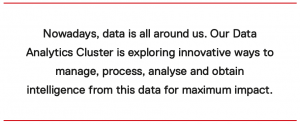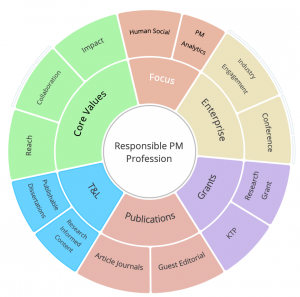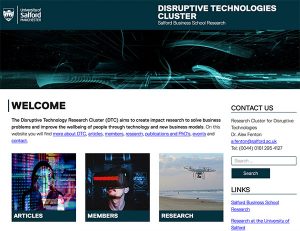
Salford Business School’s research is setting a path to shape thinking and the application of technology in a post-pandemic and post-Brexit world. Our aim is to create business school research and solutions for the myriad challenges of Industry 4.0 and the ethical and legal issues facing society. Our research acts as the integrator for a diversity of disciplines, the translator from technology to management (and back again) and as the critical voice in the need to adopt of technology fully recognising the human and social impact that these decisions bring. We are building a vibrant and industry focussed research culture that lets a diverse range of academics create meaningful and impactful research for the good of society.
Research challenges today are invariably complex and interlinked. As the world recovers from the consequence of the COVID-19 pandemic we are seeing many of the social inequalities that have been exposed by it. At the same time we must face up to the challenges of human-induced climate change and the new ways of working that transform societies. Business School researchers make an informed, value-driven contribution to society as it addresses these challenges.
Articulating such a clear and focused strategy comes at the end of a seven year research cycle, marks the start of a new cycle and a new era for Salford Business School.
The University of Salford’s institutional areas of interest over the next seven year are:
- Robotics and Autonomous Systems – Fundamental research in soft robotics and autonomous systems. Also, ethics, governance, regulation and operation of such systems
- Smart Living and Smart Working – Smart and urban futures, Health, Smart systems and controls
- Digital – Big Data and Analytics, Ethics and issues of privacy and surveillance
With that in mind we have created five new research clusters within the School that let us rise to this complex and interlinked challenges. The clusters are Data Analytics, Project Management, Operational Research and Process Optimisation, Disruptive Technologies cluster and Governance,Legal and Ethical issues.
Data analytics cluster
 This cluster is led by Richard Dron and Ambarin Khan. The Data Analytics Cluster has the aim of creating impactful research that solves business problems by focussing on the transformation of data into actionable information and knowledge. In doing so, the resultant knowledge adds value to business, enables healthier lives, optimises processes and enriches the digital experiences of all users.
This cluster is led by Richard Dron and Ambarin Khan. The Data Analytics Cluster has the aim of creating impactful research that solves business problems by focussing on the transformation of data into actionable information and knowledge. In doing so, the resultant knowledge adds value to business, enables healthier lives, optimises processes and enriches the digital experiences of all users. Project Management cluster
Project Management cluster
- Benefits realisation and Value Generation
- Procurement and contract
- Megaprojects
- Sustainable projects
- Agile and lean projects
- Project Analytics
- Governance and assurance
- Project Citizenship Behaviour
- Legal Project Management
- Project studies
Read more on the Project Management cluster website.
Cluster for operational research and process optimization (CORPO)
Disruptive Technologies cluster
 Cluster leads Dr. Alex Fenton and Dr. Yun Chen. This cluster aims to create impact research to solve business problems and improve the wellbeing of people through technology and new business models. Society faces massive challenges of an increasing global population with finite resources, inequality and global warming. Renewable energy can be harnessed to rise to the challenge of sustainability, carbon zero, smart cities and new models can help to reduce wastage. Digital transformation and innovative business models can help adapt to these challenges to create new opportunities. This includes digital product design and advanced manufacturing through connected systems, and improved processes. We need new approaches to education, innovation and change to create new realities and enhanced experiences. Artificial intelligence, software, smartphones apps and wearable technologies create data which can support this and be visualised to give real time insights and create people focussed organisations powered by data. Read more on the Disruptive Technologies cluster website.
Cluster leads Dr. Alex Fenton and Dr. Yun Chen. This cluster aims to create impact research to solve business problems and improve the wellbeing of people through technology and new business models. Society faces massive challenges of an increasing global population with finite resources, inequality and global warming. Renewable energy can be harnessed to rise to the challenge of sustainability, carbon zero, smart cities and new models can help to reduce wastage. Digital transformation and innovative business models can help adapt to these challenges to create new opportunities. This includes digital product design and advanced manufacturing through connected systems, and improved processes. We need new approaches to education, innovation and change to create new realities and enhanced experiences. Artificial intelligence, software, smartphones apps and wearable technologies create data which can support this and be visualised to give real time insights and create people focussed organisations powered by data. Read more on the Disruptive Technologies cluster website.
Governance, Legal and Ethical Issues cluster
Cluster collaborations
These are exciting and challenging times and real world, impact research has never been more important. We invite University staff and students, people from industry and others to contact the relevant people listed above to discuss ways in which we can collaborate in any of the areas mentioned in this post or for further information.